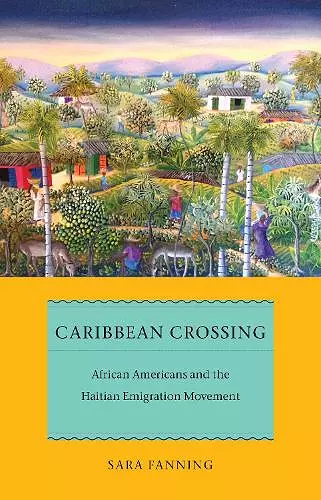Caribbean Crossing
African Americans and the Haitian Emigration Movement
Format:Hardback
Publisher:New York University Press
Published:2nd Jan '15
Currently unavailable, and unfortunately no date known when it will be back

Shortly after winning its independence in 1804, Haiti’s leaders realized
that if their nation was to survive, it needed to build strong diplomatic bonds
with other nations. Haiti’s first leaders looked especially hard at the United
States, which had a sizeable free black population that included vocal
champions of black emigration and colonization. In the 1820s, President
Jean-Pierre Boyer helped facilitate a migration of thousands of black Americans
to Haiti with promises of ample land, rich commercial prospects, and most
importantly, a black state. His ideas struck a chord with both blacks and
whites in America. Journalists and black community leaders advertised emigration
to Haiti as a way for African Americans to resist discrimination and show the
world that the black race could be an equal on the world stage, while
antislavery whites sought to support a nation founded by liberated slaves.
Black and white businessmen were excited by trade potential, and racist whites
viewed Haiti has a way to export the race problem that plagued America.
By the end of the decade, black Americans migration to Haiti began to ebb as
emigrants realized that the Caribbean republic wasn’t the black Eden they’d
anticipated. Caribbean Crossing
documents the rise and fall of the campaign for black emigration to Haiti,
drawing on a variety of archival sources to share the rich voices of the
emigrants themselves. Using letters, diary accounts, travelers’ reports,
newspaper articles, and American, British, and French consulate records, Sara
Fanning profiles the emigrants and analyzes the diverse motivations that fueled
this unique early moment in both American and Haitian history.
"This period of Haitian history is notoriously difficult to study due to the scarcity of primary sources, but Fanning skillfully uses American newspaper publications for evidence of the motives, demographics, and experiences of the migrants as well as the political and economic incentives of those promoting the movement." * Journal of American Ethnic History *
"In this concise study of early nineteenth-century African American migration to Haiti, the only free nation at that time committed to anti-slavery and racial equality, Sara Fanning opens a new window on American views toward the black republic as both a haven for urban free blacks seeking refuge from racial oppression at home, and as a potential solution to the twin problems of U.S. slavery and abolition. Using various ship records, contemporary correspondence and memoirs, the book traces the crossings of individual African American exiles and offers for the first time an inside view of life in Haiti for these & political pilgrims. The book makes a much needed contribution to the history of race relations in the early national periods of the first two independent republics of the Americas." -- Carolyn Fick,Concordia University
"Most Americans know about the & return to Africa movement among free blacks in the US, which resulted in the formation of a new African nation, the Republic of Liberia, in 1847. Probably far fewer know about the slave rebellion against French colonial masters. To African Americans in the early 19thcentury, Haiti embodied racial equality and freedom from intense, institutionalized racial discrimination and insufferable white supremacy. Fanning provides the first comprehensive account of this forgotten chapter in US and African American history." * Choice *
"[]Caribbean Crossingdeserves to be read because of its clarity, its methodology, and its multidimensionality." * The Journal of Southern History *
"Caribbean Crossingis worth reading for those interested in Haitian history and as a case study in the pitfalls of racial migration." * The Journal of American History *
ISBN: 9780814764930
Dimensions: unknown
Weight: 408g
192 pages